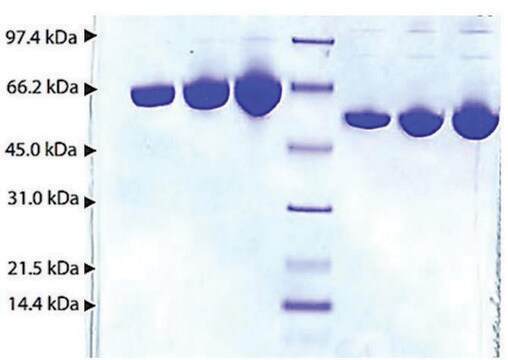SRP6182
Human Serum Albumin
≥98% (SDS-PAGE)
Synonym(s):
GIG20, GIG42, HSA, PRO0903, PRO1708, PRO2044, PRO2619, PRO2675, UNQ696/PRO1341, serum albumin
Sign Into View Organizational & Contract Pricing
All Photos(1)
About This Item
UNSPSC Code:
12352202
NACRES:
NA.32
Recommended Products
General description
The gene HSA (human serum albumin) is mapped to human chromosome 4q13.3. The gene encodes a protein of 585 amino acids with a molecular weight of 66.4kDa. HSA is the most abundant protein in the plasma and has many metal-binding sites.
Application
HSA (human serum albumin) has been used for the development of automated dye-binding method for serum albumin determination using bromcresol purple. It has also been used to study effect of HSA on DNA transfection by lipoplexes.
Biochem/physiol Actions
HSA (human serum albumin) mainly works as a carrier for various nutrients, metabolites and xenobiotics. It interacts with plasma zinc and regulates uptake of zinc in cells. HSA plays a crucial role in drug pharmacokinetics. It also controls oncotic pressure and volume of the blood. Mutations in the gene are linked with congenital analbuminemia and familial dysalbuminemic hyperthyroxinemia.
Physical form
Sterile filtered yellowish liquid.
Storage Class Code
10 - Combustible liquids
WGK
WGK 3
Flash Point(F)
Not applicable
Flash Point(C)
Not applicable
Choose from one of the most recent versions:
Certificates of Analysis (COA)
Lot/Batch Number
Don't see the Right Version?
If you require a particular version, you can look up a specific certificate by the Lot or Batch number.
Already Own This Product?
Find documentation for the products that you have recently purchased in the Document Library.
Customers Also Viewed
Human serum albumin enhances DNA transfection by lipoplexes and confers resistance to inhibition by serum.
Sim?es S
Biochimica et Biophysica Acta, 1463, 459-469 (2000)
An identical missense mutation in the albumin gene results in familial dysalbuminemic hyperthyroxinemia in 8 unrelated families.
Sunthornthepvarakul T
Biochemical and Biophysical Research Communications, 202, 781-787 (1994)
A nucleotide insertion and frameshift cause analbuminemia in an Italian family.
Watkins S
Proceedings of the National Academy of Sciences of the USA, 91, 2275-2279 (1994)
A nucleotide deletion and frame-shift cause analbuminemia in a Turkish family.
Caridi G
Biochemia Medica, 26, 264-271 (2016)
Structure and ligand binding properties of human serum albumin.
Kragh-Hansen U
Danish Medical Bulletin, 37, 57-84 (1990)
Our team of scientists has experience in all areas of research including Life Science, Material Science, Chemical Synthesis, Chromatography, Analytical and many others.
Contact Technical Service


